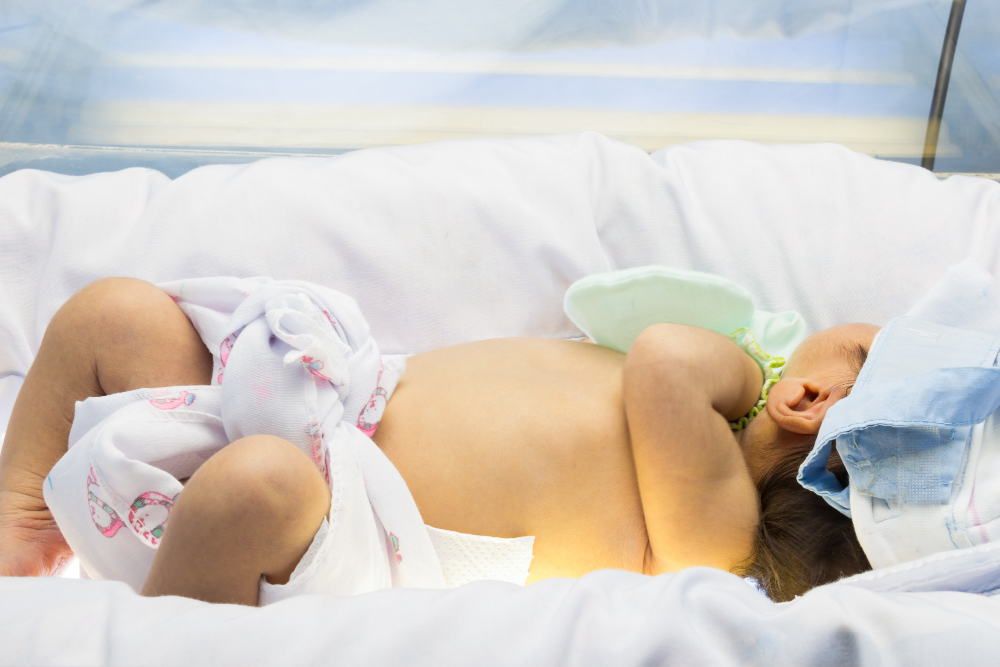What is neonatal jaundice?
Neonatal jaundice is a common condition that occurs in newborn babies when they have a high level of bilirubin in their blood. Bilirubin is a yellow pigment that is produced when red blood cells break down. Normally, the liver removes bilirubin from the blood, but in newborns, the liver may not be fully developed, leading to an accumulation of bilirubin and causing jaundice. Symptoms of neonatal jaundice include yellowing of the skin and eyes. Most cases of neonatal jaundice are mild and resolve on their own, but severe cases may require medical treatment.
What are the symptoms of neonatal jaundice?
The symptoms of neonatal jaundice include:
- Yellowing of the skin and eyes
- Dark urine
- Pale stools
- Lethargy and excessive sleepiness
- High-pitched crying
It’s important to note that these symptoms can be present in other conditions as well, and a doctor should be consulted to make an accurate diagnosis.
How to tell if my child had mild or severe jaundice?
The difference lies in the symptoms.
Mild jaundice manifests with low levels of bilirubin in the blood, causing only slight yellowing of the skin and eyes. On the other hand, severe jaundice manifests with more critical symptoms, such as lethargy, poor feeding, excessive sleepiness, high pitched crying and more.
If you notice any of the severe jaundice symptoms, it is very important to get your baby checked by a doctor immediately.
Mild jaundice symptoms and treatment
As mentioned earlier, mild jaundice only symptoms are slight yellowing of the skin and eyes. Mild jaundice is common in newborn babies and usually resolves on its own without any treatment within 2-3 weeks. Mild jaundice is not harmful and does not cause any long-term health problems. However, in some cases, it may indicate a more serious underlying condition, so it is important to monitor the baby and seek medical advice if necessary.
Mild neonatal jaundice can often be treated at home through as follows:
- Increase feedings: Encourage the baby to breastfeed/formula feed more frequently, as this will help to remove bilirubin from the baby’s system.
- Ensure hydration: Make sure the baby stays hydrated by giving them enough fluids, as dehydration can worsen jaundice.
- Increase exposure to natural light: Spend time with the baby in a well-lit room, such as near a window, as this can help to break down bilirubin.
Moderate levels of bilirubin indicate a more critical condition, therefore your doctor could recommend phototherapy as the first line of treatment for your baby.

What is severe neonatal jaundice and how is it treated?
Severe neonatal jaundice is a form of jaundice that occurs in newborn babies when the level of bilirubin in the blood becomes very high. This can cause the baby’s skin and eyes to become deeply yellow. High levels of bilirubin can be harmful to a baby’s brain and nervous system, and that is why a prompt medical attention is required. Symptoms of severe neonatal jaundice may include:
- Deep yellowing of the skin and eyes
- High-pitched crying
- Lethargy and excessive sleepiness
- Poor feeding
- Arching of the back and neck
- Stiffness and tremors
Severe neonatal jaundice requires prompt medical attention. Treatment methods available:
- Phototherapy
- Exchange transfusion: This procedure involves removing a small amount of the baby’s blood and replacing it with fresh blood from a donor.
Subscribe to our email newsletter to get the latest posts delivered right to your email.


Comments